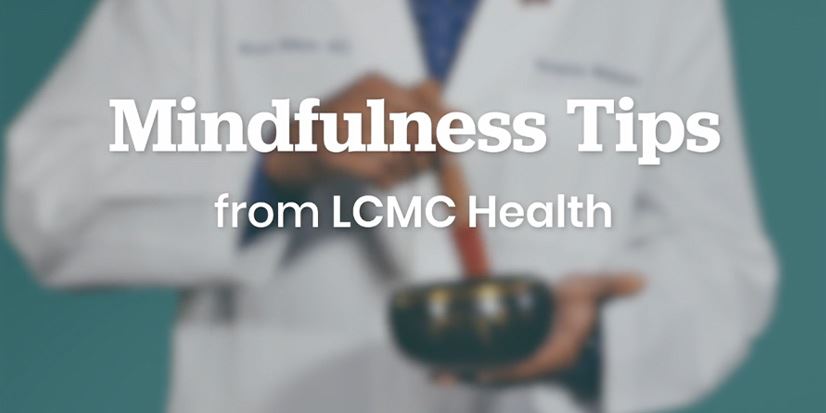Doctor's best advice for staying calm, active, productive and balanced during Coronavirus
- Posted on:

These are certainly unusual times. During these days of social distancing, working from home, constant news, and alerts, we are all feeling stressed and filled with anxiety. Stress can take its toll on our physical and mental health.
Dr. Bruce Wilson, an Internal Medicine physician at West Jefferson Medical Center, says anything you can do to help relieve the stress of the mind will also help relieve the stress on the body.
Coping with stress will make you, the people you care about, and your community stronger.
Tips to reduce or manage the stress in your life:
- Quiet your mind. Use deep breathing and visualization methods to calm your mind and slow your breathing. When you're stressed, your mind can make things seem worse. It does this by creating endless versions of the coming disaster. This affects your body, too. The body can't tell the difference between what's real and what's not. So it reacts with a greater physical response.
- Stay in the present. You can calm both your mind and your body by keeping your mind in the present. The present is hardly ever as stressful as an imagined future or a past full of regrets. To stay in the present, center your attention on your breathing, a sound or visual pattern, a repetitive movement, or meditation.
- Review your coping responses. Confidence is helpful in fighting stress. And it builds on memories of past successes. Think about successes you've had with other stressful life events. Recall some of the things you did to cope. Think about writing this information down.
- Take time out to relax. Take time to calm down by relaxing. Use relaxation methods to calm your mind and body. Try listening to soothing music, taking a walk, gardening, reading, or exercising. You could also choose to do more formal relaxation such as deep breathing or meditation.
- Meditate. A great way to help destress is meditation. You may be thinking, "I don't have time for that." But you do! It only takes one minute. Start with a minute and work up to five. A great way to meditate is through affirmations. Tell yourself something great, like, "I am love."
- Eat well and stay active. Eat a healthy diet and exercise regularly. A healthy, well-balanced diet and exercise can keep your body fit and able to fight disease. Exercise also is an excellent way to lift up your mood.
- Stick to structure. Keeping some semblance of your regular routine and staying organized will help manage your time more efficiently. A great way to declutter your mind is by making a to-do list. This helps get all those thoughts in your brain down on paper and you longer have to feel as though you've forgotten something, which helps to lower anxiety. Not only that, but you also get the added bonus of crossing them off your list.
- Talk to someone you trust. Talk about your stressful situations with someone you trust. Sometimes just talking about your problems and concerns can help you put them into perspective. It can also give you insights into ways to deal with them. Remember, no one can do it all alone. Ask for help.
Everyone reacts differently to stressful situations.
For parents
Children and teens react, in part, to what they see from the adults around them. When parents and caregivers deal with the COVID-19 calmly and confidently, they can provide the best support for their children. Parents can be more reassuring to others around them, especially children, if they are better prepared.
Not all children and teens respond to stress in the same way. Some common changes to watch for include
- Excessive crying or irritation in younger children
- Returning to behaviors they have outgrown (for example, toileting accidents or bedwetting)
- Excessive worry or sadness
- Unhealthy eating or sleeping habits
- Irritability and “acting out” behaviors in teens
- Poor school performance or avoiding school
- Difficulty with attention and concentration
- Avoidance of activities enjoyed in the past
- Unexplained headaches or body pain
- Use of alcohol, tobacco, or other drugs
There are many things you can do to support your child
- Take time to talk with your child or teen about the COVID-19 outbreak. Answer questions and share facts about COVID-19 in a way that your child or teen can understand.
- Reassure your child or teen that they are safe. Let them know it is ok if they feel upset. Share with them how you deal with your own stress so that they can learn how to cope from you.
- Limit your family’s exposure to news coverage of the event, including social media. Children may misinterpret what they hear and can be frightened about something they do not understand.
- Try to keep up with regular routines. If schools are closed, create a schedule for learning activities and relaxing or fun activities.
- Be a role model. Take breaks, get plenty of sleep, exercise, and eat well. Connect with your friends and family members.
Learn more about helping children cope.
For responders
Responding to COVID-19 can take an emotional toll on you. There are things you can do to reduce secondary traumatic stress (STS) reactions:
- Acknowledge that STS can impact anyone helping families after a traumatic event.
- Learn the symptoms including physical (fatigue, illness) and mental (fear, withdrawal, guilt).
- Allow time for you and your family to recover from responding to the pandemic.
- Create a menu of personal self-care activities that you enjoy, such as spending time with friends and family, exercising, or reading a book.
- Take a break from media coverage of COVID-19.
- Ask for help if you feel overwhelmed or concerned that COVID-19 is affecting your ability to care for your family and patients as you did before the outbreak.
Learn more tips for taking care of yourself during emergency response.
For people who have been released from quarantine
Being separated from others if a healthcare provider thinks you may have been exposed to COVID-19 can be stressful, even if you do not get sick. Everyone feels differently after coming out of quarantine.
Some feelings include :
- Mixed emotions, including relief after quarantine
- Fear and worry about your own health and the health of your loved ones
- Stress from the experience of monitoring yourself or being monitored by others for signs and symptoms of COVID-19
- Sadness, anger, or frustration because friends or loved ones have unfounded fears of contracting the disease from contact with you, even though you have been determined not to be contagious
- Guilt about not being able to perform normal work or parenting duties during quarantine
- Other emotional or mental health changes
Children may also feel upset or have other strong emotions if they, or someone they know, has been released from quarantine. You can help your child cope.
If you, or someone you care about, are feeling overwhelmed with emotions like sadness, depression, or anxiety, or feel like you want to harm yourself or others call:
- 911
- Substance Abuse and Mental Health Services Administration’s (SAMHSA’s) Disaster Distress Helpline: 1-800-985-5990
- Text TalkWithUs to 66746. (TTY 1-800-846-8517)

